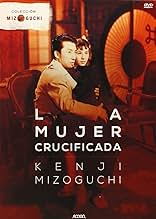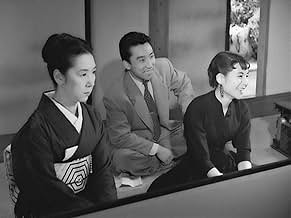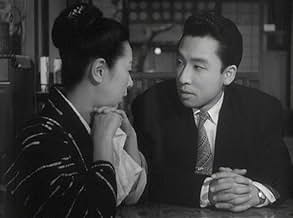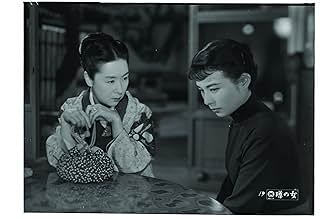NOTE IMDb
7,4/10
1,5 k
MA NOTE
Hatsuko Umabuchi est une femme veuve qui gère une maison de geishas à Kyoto. Sa fille Yukiko revient de Tokyo après avoir tenté de se suicider lorsque son amant avait découvert le métier de ... Tout lireHatsuko Umabuchi est une femme veuve qui gère une maison de geishas à Kyoto. Sa fille Yukiko revient de Tokyo après avoir tenté de se suicider lorsque son amant avait découvert le métier de sa mère.Hatsuko Umabuchi est une femme veuve qui gère une maison de geishas à Kyoto. Sa fille Yukiko revient de Tokyo après avoir tenté de se suicider lorsque son amant avait découvert le métier de sa mère.
- Réalisation
- Scénario
- Casting principal
Avis à la une
There is not really much that could be said about this beautifully executed film; if you are familiar with Mizoguchi's themes, you will most likely know that the majority of his films are based on women's suffering. This film is no exception; it revolves around a geisha house run by a widow whose daughter had attempted to commit suicide, after her boyfriend found out about her mother's everyday profession (this can actually be found in the film's synopsis). However, the daughter then decides to look after all the women carrying out their duties at her mother's business, as she learns they are there because hard times require it. Between mother and daughter mediates a young doctor who also takes part in the business, taking good care of the geisha.
I would recommend this film to anyone interested in classic Japanese cinema. However, if you are new to Mizoguchi, you might want to start with his most famous films.
My score: 9/10
I would recommend this film to anyone interested in classic Japanese cinema. However, if you are new to Mizoguchi, you might want to start with his most famous films.
My score: 9/10
How does a middle-aged woman hold the attention of a handsome young man when her attractive and intelligent daughter captures his attention ? Can she fight back ? Is bribery an effective tactic ? An age-old story where three top-rank actors tend to overact, but are kept in check by master director Mizoguchi. And the intensity of the main story is nicely balanced by the little day-to-day dramas of running a bawdy house. The side-story of the geisha who collapses and becomes very ill, and the appearance of her younger sister who begs to take her place because of family poverty, is touching and well-handled.
I've seen several movies made around this time on theme of geisha houses lately, and although this is one of lesser among them, I would nevertheless recommend this movie. Tanaka Kinuyo and Kuga Yoshiko are two of Japan's great actresses of the 50s, and to see them slug it out over a weak and vain young man is something to behold.
I've seen several movies made around this time on theme of geisha houses lately, and although this is one of lesser among them, I would nevertheless recommend this movie. Tanaka Kinuyo and Kuga Yoshiko are two of Japan's great actresses of the 50s, and to see them slug it out over a weak and vain young man is something to behold.
Lesser known Kenji Mizuguchi melodrama nonetheless reveals his mastery for realistic, highly dramatic and heart-felt stories of female fates; superb cast, beautiful cinematography and excellent settings all around.
The woman who is talked about and rumored or crucified in the titles of this film, is widowed but independently and well manages a Geisha house. She is no longer young but still charming and has a young doctor as a lover who regularly visits the house. Suddenly the woman's daughter, about twenty years old, returns from Tokyo after years, after having attempted suicide. From here begins a story that alternates drama, scenes of life, intimate psychology, art, crazy love.
Film directed by Mizoguchi in 1954 where the director, as in other films, is very good at alternating, making coexist and merging multiple atmospheres and genres. Not too slow narration, attention to psychology, feelings. There are very deep and visually strong scenes that remain, especially those of classical Japanese theater.
I highly recommend this film for watching a drama told in a splendid, artistic and profound way. After watching about ten films I can say that Kenji Mizoguchi surprises each time in a different and positive way.
Film directed by Mizoguchi in 1954 where the director, as in other films, is very good at alternating, making coexist and merging multiple atmospheres and genres. Not too slow narration, attention to psychology, feelings. There are very deep and visually strong scenes that remain, especially those of classical Japanese theater.
I highly recommend this film for watching a drama told in a splendid, artistic and profound way. After watching about ten films I can say that Kenji Mizoguchi surprises each time in a different and positive way.
Yoshiko Kuga was engaged, but when her fiance found out what her mother was, he broke it off. Miss Kuga tried to kill herself. Now her mother, Kinuyo Tanaka has fetched her home to her brothel in Kyoto. Miss Kuga hates the work, but she behaves compassionately towards the girls who work there. It's a well-run establishment, and the girls are well taken care of. There's even a doctor on call, Tomoemon Otani. He's Miss Tanaka's lover. She is preparing to sell the place, finance a clinic for Otani, and marry him. However, Miss Kuga doesn't know this, and she and Otani plot to run off to Tokyo together.
It's a typically sympathetic look at the profession by Kenji Mizoguchi, and with the fearless Miss Tanaka playing an aging mistress, it's very well acted. It's not one of Mizoguchi's major pieces, but it's a fine minor effort.
It's a typically sympathetic look at the profession by Kenji Mizoguchi, and with the fearless Miss Tanaka playing an aging mistress, it's very well acted. It's not one of Mizoguchi's major pieces, but it's a fine minor effort.
Le saviez-vous
- ConnexionsReferenced in Aru eiga-kantoku no shôgai (1975)
- Bandes originalesArabesque No. 1
Composed by Claude Debussy
Meilleurs choix
Connectez-vous pour évaluer et suivre la liste de favoris afin de recevoir des recommandations personnalisées
- How long is The Woman of Rumour?Alimenté par Alexa
Détails
- Date de sortie
- Pays d’origine
- Langue
- Aussi connu sous le nom de
- Une femme crucifiée
- Société de production
- Voir plus de crédits d'entreprise sur IMDbPro
Box-office
- Montant brut mondial
- 8 860 $US
- Durée1 heure 23 minutes
- Couleur
- Mixage
- Rapport de forme
- 1.37 : 1
Contribuer à cette page
Suggérer une modification ou ajouter du contenu manquant

Lacune principale
By what name was Une femme dont on parle (1954) officially released in Canada in English?
Répondre
![Regarder Trailer [OV]](https://m.media-amazon.com/images/M/MV5BMmJlYTFiZDQtYjhkZi00NzVlLWExYTktYWMwMDdjODk5MmU2XkEyXkFqcGdeQXRyYW5zY29kZS13b3JrZmxvdw@@._V1_QL75_UX500_CR0)
























